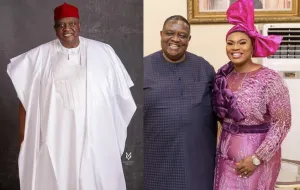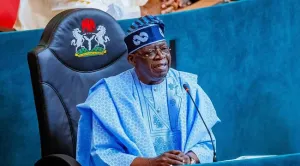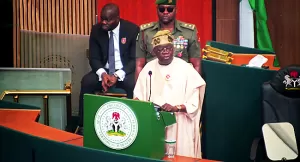Protests Erupt in Abuja as Supporters Demand Release of VeryDarkMan

Abuja, Nigeria – On May 5, 2025, the streets of Nigeria’s Federal Capital Territory (FCT) buzzed with fervor as hundreds of protesters converged at Dantata Bridge, demanding the immediate release of Martins Vincent Otse, popularly known as VeryDarkMan (VDM). The outspoken social media influencer and activist was arrested on May 2, 2025, by operatives of the Economic and Financial Crimes Commission (EFCC) at a Guaranty Trust Bank (GTB) branch in Area 3, Garki, Abuja. The arrest, linked to allegations of cyberstalking, has sparked widespread outrage, with supporters accusing authorities of attempting to silence VDM’s vocal criticism of institutional misconduct.
The Arrest That Sparked a Movement
The controversy began when VDM took to social media to call out GTB over unauthorized deductions from his mother’s bank account, an issue that resonated with many Nigerians frustrated by banking irregularities. In a video that quickly went viral, VDM accused the bank of financial mismanagement and demanded accountability. His outspoken stance, however, led to his dramatic arrest at the GTB branch, where he was reportedly apprehended alongside his mother. According to sources, the EFCC labeled VDM’s actions as cyberstalking, though no formal charges have been publicly detailed.
CCTV footage circulating online has fueled speculation of a premeditated operation, showing EFCC operatives swiftly detaining VDM in what many describe as a targeted move to curb his activism. Adding to public concern, VDM’s mother, who was with him at the time of the arrest, has not been seen or heard from since, raising fears about her safety and whereabouts.
Protests Take Center Stage
The response from VDM’s supporters was swift and resolute. By May 4, 2025, protesters, predominantly Nigerian youths, had mobilized under the hashtags #ReleaseVDM and #FreeVDM, gathering at Dantata Bridge to demand his freedom. Holding placards with messages like “Free VDM Now!” and “Speaking Truth is Not a Crime,” the demonstrators chanted slogans and called on the EFCC to release the activist without delay. Videos shared on X captured the intensity of the protests, with some organizers announcing plans for further demonstrations outside the EFCC’s headquarters in Abuja.
The protests have drawn a diverse coalition, including ordinary citizens, activists, and high-profile figures. Afrobeat superstar Davido publicly voiced his support, tweeting, “Free VDM! Nigeria cannot move forward if we silence those who speak for the people.” The Human Rights Writers Association of Nigeria (HURIWA) and the Take It Back Movement issued statements condemning the arrest as unlawful and an assault on free speech. HURIWA’s National Coordinator, Comrade Emmanuel Onwubiko, described the EFCC’s actions as “a desperate attempt to suppress a voice that has consistently exposed corruption and impunity.”
Legal and Public Backlash
VDM’s lawyer, Deji Adeyanju, has been at the forefront of the legal fight for his release. In a press statement, Adeyanju called the detention “unacceptable” and argued that VDM’s only crime was demanding accountability from powerful institutions. “Martins Otse has been a thorn in the flesh of those who thrive on opacity and injustice,” Adeyanju said. “His arrest is a clear message to Nigerians: stay silent or face persecution.”
Public sentiment on X and other platforms has echoed this view, with many accusing the EFCC of overstepping its mandate. Posts on X have highlighted VDM’s history of exposing issues ranging from police brutality to fraudulent practices by public figures, earning him a loyal following among Nigeria’s youth. “VDM is our voice,” one protester told reporters. “If they lock him up, they’re locking up all of us.”
The EFCC, however, has remained tight-lipped. As of May 5, 2025, the agency has not issued an official statement clarifying the grounds for VDM’s arrest or his current status. Reports indicate that access to VDM has been heavily restricted, with neither his legal team nor family members allowed to see him. This lack of transparency has only deepened public distrust, with many questioning the EFIn response to queries about the whereabouts of VDM’s mother, the EFCC has provided no information, further escalating concerns.
A Broader Fight for Freedom
The protests over VDM’s arrest have transcended the individual case, spotlighting broader issues of freedom of expression, institutional transparency, and the state’s use of power to silence dissent in Nigeria. VDM, known for his unfiltered critiques of government agencies, celebrities, and corporations, has long been a polarizing figure. While some view him as a fearless advocate for the common man, others criticize his confrontational style as divisive. Yet, his arrest has united a significant portion of the public, who see it as an attack on their right to hold institutions accountable.
Analysts point out that VDM’s case reflects a growing trend of state agencies using vague charges like “cyberstalking” or “cyberbullying” to target critics. The Cybercrimes Act of 2015, under which VDM was reportedly arrested, has been criticized for its broad and ambiguous provisions, which rights groups argue are prone to abuse. “This is not just about VeryDarkMan,” said Onwubiko of HURIWA. “It’s about the shrinking civic space in Nigeria and the weaponization of state power to intimidate citizens.”
What Lies Ahead?
As protests continue to gain momentum, the pressure on the EFCC to release VDM or provide a clear justification for his detention is mounting. Organizers have vowed to sustain the demonstrations, with some calling for nationwide solidarity actions. The involvement of influential figures like Davido and the viral spread of protest footage on X suggest that the movement is unlikely to fade quietly.
For now, VDM remains in EFCC custody, his fate uncertain. His supporters, however, are resolute, framing the fight for his release as a battle for Nigeria’s democratic soul. “We will not be silenced,” one protester declared, holding a placard that read, “Today it’s VDM, tomorrow it’s you.” As Abuja braces for more demonstrations, the nation watches closely, aware that the outcome of this standoff could shape the boundaries of free speech and activism in Nigeria for years to come.






